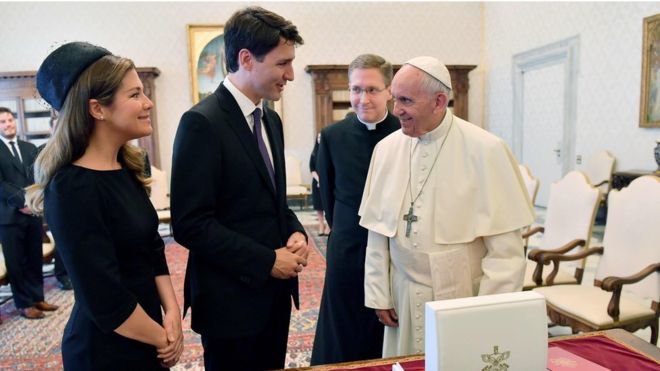An apology from the Pope would help the reconciliation process between the Catholic Church and indigenous people, according to the Canadian Prime Minister.
In a meeting between the prime minister, Justin Trudeau, and the Pontiff the issue of residential schools was discussed.
Mr Trudeau said he asked Pope Francis to “move forward on a real reconciliation” with the country’s indigenous people “by issuing an apology”.
Historically residential schools were boarding schools for indigenous Canadian people, which were supposed to teach them how to assimilate into Canadian culture.
However the children were subjected to several and severe forms of abuse and many of them died while attending the schools. Although they were run by several different religious denominations, the Catholic Church operated around half of them over the years.
It is believed Mr Trudeau said the Pope seemed open to the proposal, adding that Pope Francis told him “his entire life has been dedicated to supporting marginalised people in the world, fighting for them”.
Recommendation
The Truth and Reconciliation Commission on Canada seeks reconciliation for the Aboriginal people of Canada, and has issued a recommendation that the Pope visits the country to publicly apologise on behalf of the Catholic Church.
During the 30-minute meeting Mr Trudeau discussed climate change, religious diversity and indigenous people.
Mr Trudeau, who is a Catholic, says he invited the Pope to Canada and gifted him with a set of Jesuit Relations books which help detail Canada’s beginnings. He also gave him a Montagnais-French dictionary written by a French Jesuit in the 17th Century.
However, there was also vast differences in opinion when it came to the issues surrounding abortion and the family.
In March Mr Trudeau’s government committed to investing $650m (€430m) over three years to provide abortion and other services to the developing world.
A statement released by the Vatican said: “In the cordial discussions the good bilateral relations between the Holy See and Canada were evoked, along with the contribution of the Catholic Church to the social life of the country.
“The parties then focused on the themes of integration and reconciliation, as well as religious freedom and current ethical issues.
“Finally, in the light of the results of the recent G7 summit, attention turned to various matters of an international nature, with special attention to the Middle East and areas of conflict,” the statement read.


 Canadian Prime Minister Trudeau and Pope Francos
Canadian Prime Minister Trudeau and Pope Francos 